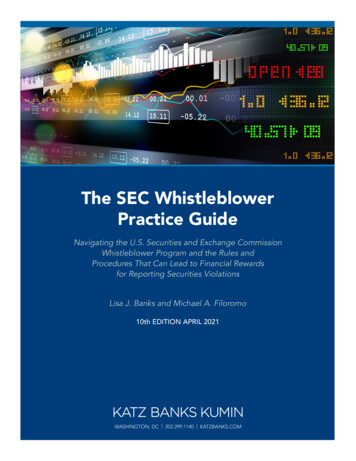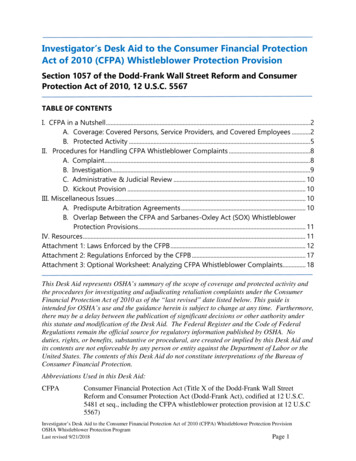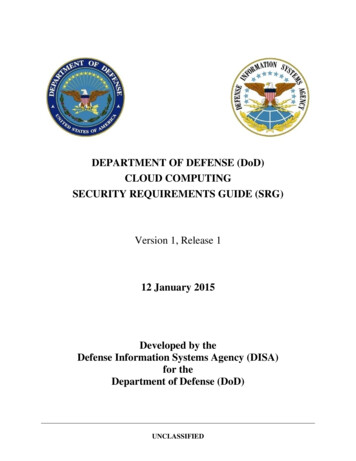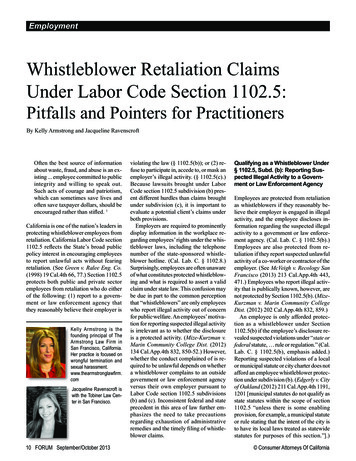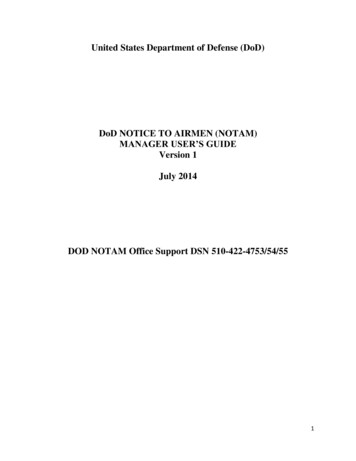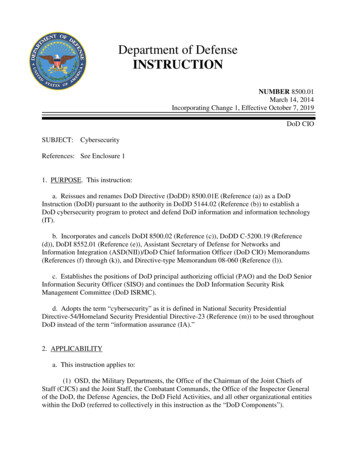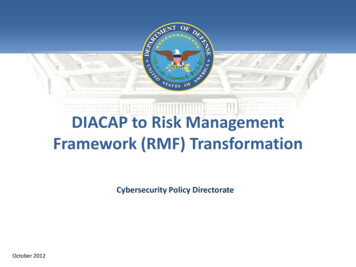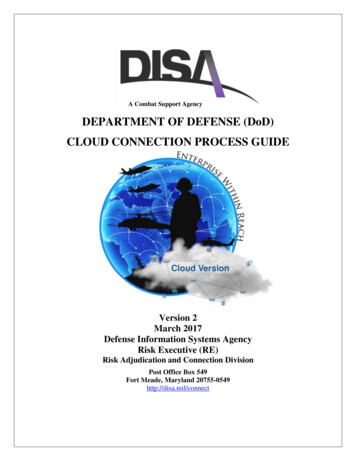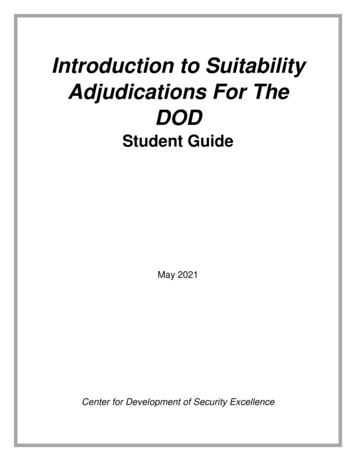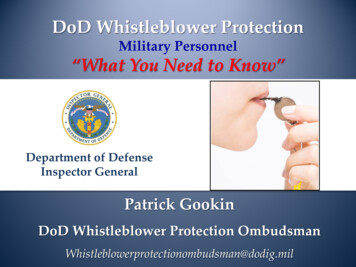
Transcription
DoD Whistleblower ProtectionMilitary Personnel“What You Need to Know”Department of DefenseInspector GeneralPatrick GookinDoD Whistleblower Protection l
“The DoD’s ability to protect our warfighters and safeguardthe taxpayer’s money depends on each of us. We rely heavily onour military members, civilian employees, and contractors tofreely report issues of fraud, waste, and abuse without fear ofretaliation. The following information is provided because weall are potential whistleblowers and should be aware of therelevant information pertaining to whistleblowing and theprotections we are afforded.”-Patrick Gookin, DoD WPO2
Congress wanted military personnel to report wrongdoing without fear ofretaliation and initially addressed whistleblower rights and protection for militarypersonnel in 1988 with the enactment of the “Military Whistleblower ProtectionAct” (10 U.S.C. 1034). These protections were updated and strengthened throughout the years bybroadening the definition of “protected communication” and expanding theuniverse to whom protected communications can be made. Executive Order 12674, as amended, requires Federal employees to, "disclosewaste, fraud, abuse and corruption to appropriate authorities.” The Whistleblower Protection Enhancement Act of 2012 broadened the scope ofsome of these rights and protections for civilian employees, and included theOmbudsman position for most of the larger federal agencies including theDepartment of Defense.3
The Whistleblower Ombudsman is required to educate agency employeesabout the prohibitions on retaliation for protected disclosures and rights andremedies against such retaliation. This role complements the existing responsibility of the Secretary to ensureDepartment of Defense employees are informed of their whistleblower rightsand remedies. Patrick Gookin, the Director of the DoD Hotline, was designated to serve asWhistleblower Protection Ombudsman for the Department of Defense. The Department of Defense Ombudsman may be contacted at –whistleblowerprotectionombudsman@dodig.mil4
Members of the Armed Forces shall be free to make a protectedcommunication and be free from reprisal for making or preparingto make a protected communication. No person shall restrict a member of the Armed Forces frommaking lawful communications to a member of Congress or anInspector General No person may take or threaten to take an unfavorable personnelaction, or withhold or threaten to withhold a favorable personnelaction, in reprisal against any member of the Armed Forces formaking, preparing, or being perceived as making or preparing aprotected communication.5
Reprisal taking or threatening to take an unfavorable personnel action, orwithholding or threatening to withhold a favorable personnelaction, for making, preparing, or being perceived as making orpreparing a protected communication.Restriction preventing or attempting to prevent members of the ArmedForces from making or preparing to make lawful communicationsto Members of Congress and/or an IG6
To demonstrate reprisal you must show: that you made a protected communication a personnel action was taken, withheld, or threatened the responsible management official had actual or constructiveknowledge of the protected communication prior to taking,withholding, or threatening the personnel action the protected communication was a contributing factor in thedecision to take the personnel action7
A communication in which the Armed Forces Memberreasonably believes evidences: any violation of law or regulation, including a law or regulationprohibiting rape, sexual assault, or other sexual misconduct in violationof the UCMJ, sexual harassment, or unlawful discrimination gross mismanagement gross waste of funds abuse of authority substantial and specific danger to public health or safety any threat that indicates a determination or intent to kill or causeserious bodily injury to members of the armed forces or civilians ordamage to military, Federal, or civilian property8
a member of Congress an IG a member of a DoD audit, inspection, or law enforcementorganization any person in the chain of command a court-martial proceeding any other person designated pursuant to regulations or otherestablished administrative procedures to receive suchcommunications9
Any action taken that affects or potentially affects the militarymember’s current position or career: promotion disciplinary or other corrective action transfer or reassignment performance evaluation decision on pay, benefits, awards or training referral for mental health evaluations other significant change in duties or responsibilities inconsistentwith the military member’s grade10
If you made a protected communication andbelieve you were reprised against because ofthe communication, you should considersubmitting a reprisal complaint.11
The most efficient means to report and resolve your complaint withinthe Inspector General (IG) system is by notifying your local orcommand IG office. They can be located via the following link:http://www.dodig.mil/Hotline/helpful links.html*All reprisal complaints receive DoD IG oversight regardless of where they are initially submitted.* Secondarily, complaints may be submitted to the DoD Hotline usingtheir on-line complaint form: www.dodig.mil/hotline (Internet) www.dodig.smil.mil/hotline (SIPRNet) www.dodig.ic.gov/hotline/index.html (JWICS) Phone: 1-800-424-9098 (Call prior to submitting complaints via SIPRNet orJWICS or to ask general questions regarding submitting a complaint.)12
1 year after an adverse personnel action was taken or afavorable personnel action was withheldThe Investigating Officer may still consider aninvestigation after this period if:- there are compelling reasons for the delay or- compelling evidence of the reprisal is submitted13
A military member may obtain a review of the service reprisal investigation bysubmitting a copy of the investigation to the appropriate Board for Correctionof Military Records (BCMR) Air Force irforceboardforcorrectionofmilitaryrecords Navy/Marine BCMR: http://www.donhq.navy.mil/bcnr/bcnr.htm Army BCMR:http://arba.army.pentagon.mil/ US Coast Guard: http://www.uscg.mil/legal/BCMR.asp Deputy Under Secretary of Defense for Program Integration USD(PI) (within 90days of BCMR decision) Please see DoDD 7050.06 for further information.14
Contact the DoD Whistleblower Ombudsman!The Ombudsman’s role is to facilitate the reporting of fraud, waste, andabuse by educating all agency employees about the prohibitions onretaliation for protected disclosures, and educate agency employees whohave made or are contemplating making a protected disclosure about therights and remedies against retaliation for protected disclosures.The Ombudsman is prohibited from acting as an employee’s or formeremployee’s legal representative, agent, or advocate.Contact Patrick Gookin at whistleblowerprotectionombudsman@dodig.mil15
do what’s right and protect yourself.16
retaliation and initially addressed whistleblower rights and protection for military personnel in 1988 with the enactment of the "Military Whistleblower Protection Act" (10 U.S.C. 1034). These protections were updated and strengthened throughout the years by broadening the definition of "protected communication" and expanding the
